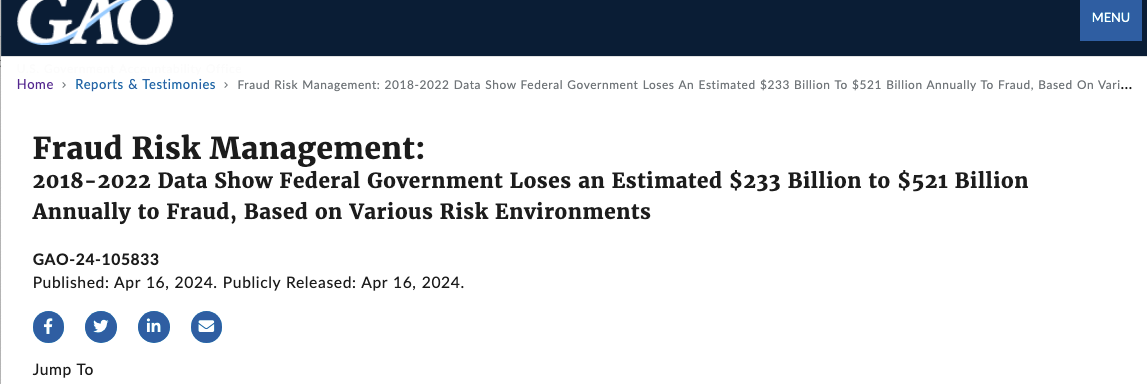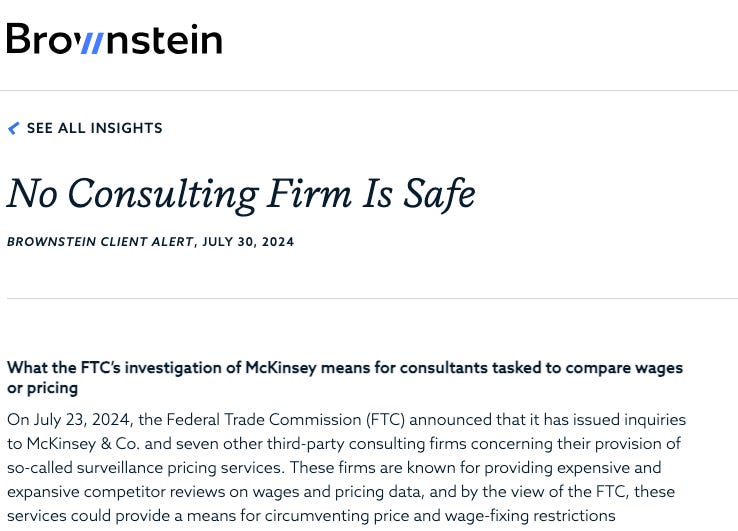Cutting Government Is Easy… If You Go After McKinsey

“What the extreme socialist favors because of his creed,” wrote New Deal Antitrust Division chief Robert Jackson in 1938, “the extreme capitalist favors, because of his greed.”
Jackson was FDR’s favorite lawyer, and he later ended up on the Supreme Court, after a stint leading prosecutions of Nazi officials at Nuremberg. And his fear, like that of most populists for hundreds of years, was the conjoined power of the state and corporations, the centralization of control in the hands of distant masters. Whether done for well-meaning reasons or for lusty greed was less important than the concentration itself.

Suspicion of Big Government and Big Business, or their combination, is about this singular dynamic. As Jackson’s heir, current antitrust chief Jonathan Kanter echoed this view in his recent farewell speech, “When companies larger, wealthier and more powerful than most world governments threaten individual liberty with coercive private taxation and regulation,” he said “it threatens our way of life.” It doesn’t matter if it’s government or business engaged in tyranny, the moral consequence of a malevolent governing power is the same.
In many ways, the anger that Donald Trump is bringing to bear, with the President-elect asking Elon Musk to cut $2 trillion of government spending through the “Department of Government Efficiency,” is taking advantage of this fear. Now, the reason I’m writing about DOGE is because a few days ago, Congress was on the verge of passing legislation to fund the government, and as part of that legislation, to restrict pharmacy benefit managers and block junk fees. Musk and Trump, however, alleged government waste, and thwarted these disruptive new laws.
This move, though it will be framed as shaking things up, is just a rehash of what we’ve seen for decades. One of the games we’ve seen from conservatives since the “New Right” elections of 1978, and through the Tea Party, and now under Trump this week, is masquerading as a disruptor, while enacting standard pro-Wall Street policy. But I think a reasonable question is as follows. What would it actually look like to take on this fusion of corporate and governing power that Americans despise?
After all, while the failure to pass populist laws was disappointing, it is worth considering why Americans think there’s massive waste and tyranny in the institutions that govern them, and why they elected someone to cut through it.
So here’s the simple way to slice through the bloat we see all around us. It’s not easy, because it would require a genuine commitment to taking on the enormously powerful people who benefit from the status quo. But it is simple to understand, and in explaining it, I hope it will also explain what Americans really want done by their new leaders.
There are plenty of studies showing massive government waste, but it’s not in the Federal workforce. It’s in procurement, the place where the government buys from the private sector, everything from pencils to software to nuclear submarines. The government spends about $750 billion a year on contracts. How much of this money is wasted?
It turns out, the answer is a lot.
The Organization for Economic Co-operation and Development (OECD) points out that about a fifth of it is stolen by contractors through bid rigging, the so-called “Collusion tax.” Collusion is when contractors get together in groups and conspire on their bids so that the government overpays for goods and services. According to the OECD, “The elimination of bid rigging could help reduce procurement prices by 20% or more.”
If you take $750 billion, just in Federal procurement spending, that’s $150 billion a year of pure overpayment, due to this one form of crime. There are other boring reports saying something similar. Earlier this year, for instance the Government Accountability Office published a report on fraud, showing the government loses between $233 billion to $521 billion on fraud.

That’s a lot of money. There are plenty of ways to get at it, two of them being to increase penalties against fraud and collusion, and shift law enforcement resources from silly things like disinformation monitoring to investigating contractor fraud. I don’t think that’ll happen, the Republicans and Donald Trump are dead set on defunding the tax cops, aka the IRS, and that’s a key agency in taking on this kind of fraud. But they could.
Still, there’s an even easier approach to taking on the problem. Go after McKinsey and management consultants throughout the Federal government.
Why take on management consultants? Well, for starters, the government spends far too much on people giving it advice. In it’s 2024 budget, the Biden administration requested $70 billion for management consulting, aka “professional services,” which is 5% of all discretionary spending. The Defense Department alone asked for $32.9 billion. So just cutting all management consulting would be a big chunk of savings.
But it goes beyond just the raw spend on consultants, to how consultants misdirect other monies. An important study in 2023 on what it costs to resurface roads at a state level – a very simply and standard need everywhere – showed why procurement waste in America is so persistent. A key reason is consultant bloat. It turns out, when you hire government employees for long-term planning, costs go down, but when you use third party consultants, they go up.
“A one standard deviation increase in DOT employment per capita is correlated with 16% lower costs,” said the study, while “a one standard deviation increase in reported consultant costs is associated with an almost 20% increase ($70,000) in cost per lane-mile.” Consulting firms replace government with flabbiness, driving up procurement spending.
But beyond the broad problem of management consultants is the specific king of management consulting itself, McKinsey. Investigating McKinsey would probably bring in a lot more savings. Here’s why. McKinsey is the brain of both the American government AND the American corporate world, so it is likely the ringleader of a lot of bloat and collusion. For example, McKinsey advised both the Food and Drug Administration, and Purdue Pharmaceuticals, on opioids, a clear fusion of corporate and governing power, that killed hundreds of thousands of Americans.
That’s not an anomaly.
Let’s start with McKinsey’s power over the state. In 2019, McKinsey worked for more than 15 federal agencies and departments, and 25 states, despite being caught by the GSA Inspector General for cheating the government out of $65 million. McKinsey helped ruin the U.S. spying apparatus with a bloated, failed contract. They helped run Trump’s U.S. Immigration and Customs Enforcement; McKinsey structured France’s terrible coronavirus response, and that of New York state.
In the first Trump administration, U.S. Immigration and Customs Enforcement not only used McKinsey extensively, it even hired McKinsey to write its own contract. During the bankruptcy of Puerto Rico, the firm helped ensure that the island spent at least $1.5 billion on professional services, aka consultants and lawyers, even as its internal hedge fund owned Puerto Rican bonds. It hasn’t gotten better under Biden. Earlier this year, McKinsey got a sole source contract to work for Space Force. And it sells an extremely expensive service for government; just one recent college graduate working at McKinsey is billed out at around $3 million a year.
And now let’s move to McKinsey’s power over big business. It’s hard to find a big company that McKinsey doesn’t work for. McKinsey keeps its client list secret, but I got documents from bankruptcy filings showing who some of them are. And as it turns out, 68% of companies being sued by Federal enforcers over antitrust violations in the merger, Orange Book fraud, monopolization, or exclusive dealing are McKinsey clients. McKinsey works for the companies keeping the price of inhalers high to consumers (and the government), it works for the big three PBMs, all major big tech giants, and all five major prime defense contractors. It is the key vector for spreading bad business habits across sectors, through private equity firms and Wall Street, and into your neighborhood.
So one reason to investigate McKinsey is because inside that company’s databases are the secrets of the world, the way every corporation prices and produces, pays its workers, and sells and manipulates the government. To give you a sense of the power of McKinsey over American corporations and how it sets prices, here’s an email I got a few months ago from a reader.
I was working as an engineer for [large oil company] in 2018. After a wave of resignations and a lot of complaints about pay versus competitors, the corporate headquarters i sent the head of remuneration to speak to the engineering staff about how “competitive” the [large oil company]’s pay was.
All the engineers and engineering managers, roughly 200 people or so, were invited into a large auditorium and provided a presentation on how we were paid versus competitors. The presentation relied on McKinsey’s data. It showed [large oil company]’s pay for given engineering disciplines (i.e. mechanical or chemical, among others) distributed across bell curves, with [large oil company] and a few dozen major and minor competitors placed along each curve.
Other slides featured a matrix that showed which competitors paid bonuses, pensions, additional money for high COL areas, and the portions of compensation that were salary versus benefits. Then we were told that [large oil company] targeted to be 50th percentile among most criteria. Basically, McKinsey had furnished [large oil company] and, presumably, its interested competitors with a breakdown of compensation data that would not otherwise be shared so freely and in such detail. I venture that without all this data that compensation would be tied to the value of our work instead of leveraging peer data to keep pay clustered tightly to industry averages. [Large oil company] uses McKinsey extensively, from adopting its recommended Org structure revision in the 2020 layoffs to performing biannual employee morale surveys every six months.
Just getting access to that information, as the FTC is trying to do, would no doubt reveal massive graft and potential savings.

There are other benefits for the Republicans for doing something about the consulting giant and its progeny in management consulting. A few days ago, the Biden Department of Justice announced it would not be prosecuting McKinsey for its role in the opioid crisis, letting the consulting giant off with a fine. Just one McKinsey official could face any jail time at all, and he will face a maximum of one year. That’s absurd, but par for the course. McKinsey routinely violates the law and harms America; it works for DARPA and Chinese entities linked to the Chinese military. There are endless lists of this firm’s harms, books about it.
Ultimately, we need a government, but we need a government that can actually do work. And the McKinsification of America, the control of our state and corporate apparatus by a network of well-heeled and unethical salesmen who facilitate lawlessness and price gouging, stands in the way of a reasonable political order. That’s what Americans are mad at, even if they can’t articulate the unseen force corrupting our government and corporations.
If Trump and Musk want to actually do something about the rhetoric they offered, well, they could start with the management consultants leaching off of all of us.
In other words, it’s McKinsey’s world, we just live here. So are you suspicious of Big Government? Big Business? Yes and yes. So be suspicious of McKinsey.
Thanks for reading. Send me tips on weird monopolies, stories I’ve missed, or comments by clicking on the title of this newsletter. Or if you work for or adjacent to a monopoly and have interesting confidential stuff to share, go ahead and do that. If you liked this issue of BIG, you can sign up here for more issues of BIG, a newsletter on how to restore fair commerce, innovation and democracy. If you really liked it, read my book, Goliath: The 100-Year War Between Monopoly Power and Democracy.
cheers,
Matt Stoller
Last week’s piece on the revival of the law against price discrimination, the “Magna Carta of Small business,” prompted this email from a private equity contact:
Hey Matt – if they start to enforce the price discrimination laws, it would likely have a big impact on roll-up strategy. Volume discounts are often the only real “synergy” in a roll-up – it they’re unavailable, it should have a big impact. There are likely some current roll-ups that rely on volume discounts for the cash flow they need to service debt. If that changed, some may be in real trouble.
In my roll-ups, it probably cost us more to run the consolidated business than it would have if they had stayed independent. The only incremental margin was discounts, and purchases were about 35% of expenses.
In other words, price discrimination promotes inefficiency.
link





